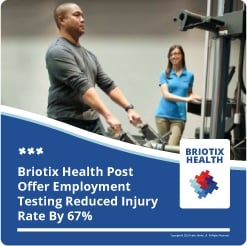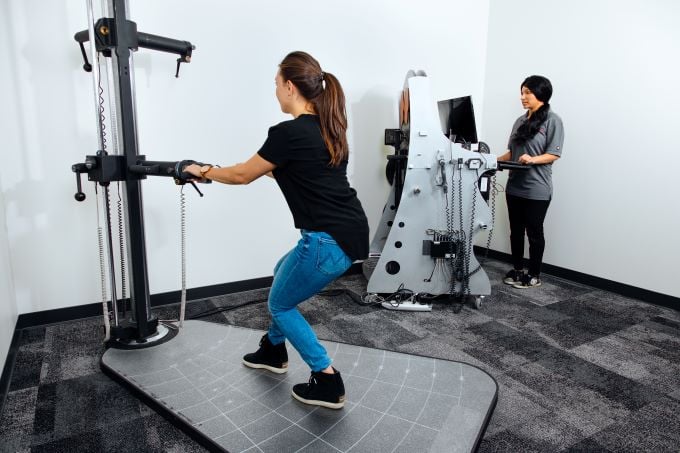Identifying and hiring the right people for your business can be a daunting task. Understanding applicant qualifications, evaluating culture fit, and completing the hiring process all take significant time investments. But, one thing you should never have to worry about is an employee being injured before they have time to find their footing.
According to OSHA, more than 40% of all work-related injuries happen to employees who have been on the job for less than one year. For companies looking to reduce these new worker injuries, a re-examination of how the hiring process works could be in order.
Introducing Pre-Employment Testing
Pre-employment testing can come in many forms. Drug screenings, cognitive exams, hard and soft skill tests, and even personality quizzes can all be seen when applying in the job market today. However, it is less common to see testing that directly correlates to job tasks.
Offering a path for hiring managers and other stakeholders to properly evaluate whether a job candidate is capable of completing all essential functions of the job can clarify decision-making and put a stop to early hire injuries in the workplace.
Established programs for these assessments also need to be fair. Results for a program like this need to identify specific data points that are legally defensible and capable of being used during the hiring process.
So what program can accomplish these goals? Future job performance does not have to be left entirely to chance. Making the right hiring decisions and identifying the best candidates based on their already existing competencies through established predictors is the right decision for any company.
POET and Pre-Employment Testing
While pre-employment testing comes in many forms Post-Offer Employment Testing, or POET for short, has shown significant reductions in new hire injuries are achievable. Post-Offer Employment Testing programs are an effective tool to place employees in positions that match their physical abilities and allow them to work safely.
Research shows that when comprehensive POET programs are put in place, companies experience significantly fewer work-related injuries. This is because, during a POET (which is executed post-offer before the job start), applicants demonstrate their capability through physical ability tests using specialized equipment and skill assessments that tie back to the physical demands of the job. The data collected during these tests help ensure the employee can handle the physical demands of the job which greatly reduces his/her risk of injury.

Increase retention with a plan in place to screen candidates. Implementing a comprehensive and proven program is key to ensuring the success of your POET rollout.
Click the banner to learn more about the impact of POET on a national manufacturing company. A substantial impact on injuries can be made in any workplace with the right system and place and the knowledge of how to implement it.
STEP 1: Analysis
The first step in implementing a POET system is determining your company’s needs. Several specific areas should be observed closely during this time.
-
Review Your Hiring Process
-
Evaluate New Hire Screening Procedures
-
Determine When Employees are Injured
For a more comprehensive breakdown of questions to determine if POET will help you reduce work-related injuries, check out the Briotix Health POET Guided Worksheet!
.png?width=1200&height=630&name=Briotix%20Health%20-%20Resource%20Download%20-%20POET%20Worksheet%20(2).png)
Step 2: Determining Job Needs with PDAs
Once you have determined your need for POET you need to identify the variables and candidate abilities you are attempting to test. A data-driven approach yields the best possible results by identifying job-related tasks that can be predictors for success in the position.
Tip: Make sure to work with your human resources department once this data is collected to properly update interview questions, job listings, and to make sure all hard skills needed are apparent.
With Briotix Health, trained clinicians go onsite to objectively measure the physical aspects of role expectations. These measurements can include:
After measurements are collected, a physical demands analysis (PDA) is created for each job role. That PDA becomes the basis of the testing protocols created in step three.
STEP 3: Development of POET Protocols
Using the PDA created from the analysis step, test templates are designed to measure an applicant's physical capacity to meet the required job demands. These test templates are created using calibrated testing equipment so they can be validated and then replicated regardless of location. Certified tests produced through this process can be used across job applicants, regardless of the candidate’s experience, to find your next hire.
While some cognitive abilities are tested with POET, it is primarily focused on measuring physical abilities.
Once the testing protocols are developed and validated, clients work with their provider to determine what test limits and goals should be implemented to achieve any desired hiring standards.
STEP 3: Live Post-Offer Employment Testing Cycle
Once a POET cycle is ready to go live, it can be administered in three different ways - whatever best fits the needs of the client.
-
Onsite: Using onsite clinicians and equipment, tests are administered during specific hours in tandem with the hiring process.
-
Partner Clinics: Employees are tested off-site at partner clinics near the work location. With companies that have low hire rates or that do not do bulk hiring this can be the best solution.
The most important aspect of a POET program once it has been implemented is refinement. Regularly reviewing the program and the injury rate of new hires can show areas where improvement can be made.

Why POET?
A resume does not always give hiring managers all the information they need on a candidate. Avoiding a hire that cannot handle the physical requirements of the job, can be essential to companies both large and small. An understanding of company culture and fit can be determined through interviews but the actual application of skills can be hard to understand.
POET and other forms of pre-employment testing enhance job interviews with more information to make decisions. Determining whether or not a candidate is truly capable of performing job duties safely is essential to hiring the right person for you. Injuries that can become claims are bad for morale, cohesion, and the bottom line. Putting your employees, old and new, first, by determining whether a new candidate can safely complete their job is paramount to a well-run business.
Once employees have successfully completed their POET tests they can be moved directly to onboarding. This additional step in the hiring process identifies potential injuries and directly improves the quality of hire in your workplace.
Contact Briotix Health to learn more about POET today!